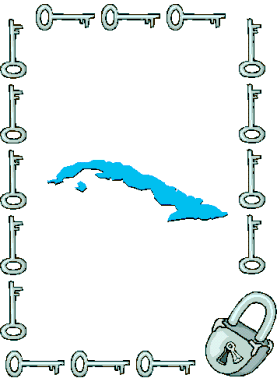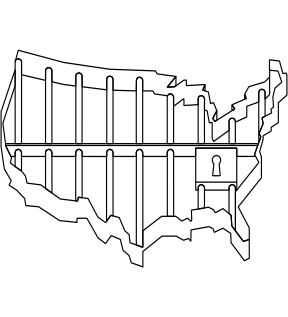 |
| Cuba Home | | |
About the Program | | |
News | | |
| |
| |
| |
| |
|
Last
Updated:5/22/03
|
|
November
2001 End
the Travel Ban to Cuba By Wayne S. Smith
As this report was being prepared for the printer, the world was suddenly transformed by the tragic events of September 11, 2001. Responding to these terrorist attacks—and beyond that to the terrorist threat in general—will of course be at the forefront of all deliberations for many months to come, in Congress as well as the executive branch. This could disrupt momentum in Congress to remove travel controls on Cuba, just as it may result in postponement of other business. That is unfortunate, but understandable. What we wish to stress here is that the events of September 11 in no way diminish the need to remove controls on travel to Cuba. On the contrary, they reinforce that need. Cuba poses no threat whatever to the security of the United States. Although for political reasons (no one wishes to offend the hard-line exiles in Miami) the State Department keeps it on the list of terrorist nations, in fact there is no objective reason for it to be there. Cuba does not support terrorism. Indeed, the Cuban government immediately condemned the attacks of September 11, expressed solidarity with the American people and offered any assistance within its means to care for and rehabilitate the victims. Those sentiments have been repeated subsequently on a number of occasions.
In this new world dominated by the struggle against terrorism, the United States needs to recognize that Cuba is not our enemy. We have our disagreements with the Cuban government, to be sure, just as we have with many other governments, but surely, in this new international context, the time has come to begin to discuss ways in which we might cooperate. And there is no better way to begin than by letting our citizens travel freely to Cuba.
 Introduction
This is an updated version of an International Policy Report entitled "The Travel Ban to Cuba" published by the Center for International Policy in May, 1994. Even though the Cold War has now been over for more than a decade, the U.S. policy of sanctions and pressures against Cuba continues unabated, though it is clearly obsolete and counterproductive. The whole policy should be abandoned. But the first component to go should be travel controls, for these not only work against the objective of opening Cuba to new ideas and influences, they also infringe in a fundamental way on the constitutional rights of American citizens to travel where they wish. The national emergency which was pointed to as the legal underpinning for these controls ended with the Cold War. In the new national emergency following the Septem ber 11 terrorist attacks, Cuba is not our enemy. That the controls are continued, especially by a government which claims to re spect the rights of its citizens and to believe in the free movement of peoples and ideas across borders, is a travesty. The U.S. government maintains that its objective in Cuba is to encourage respect for the civil and political rights of Cuban citizens, but it then violates the rights of its own by curtailing their travel to Cuba. That is hardly the best way to get across its message. And,
finally, travel controls not only desecrate U.S. laws, they stand in open violation of various international conventions to which the United States is a party.
History of U.S. travel restrictions Under the Helsinki agreements of 1975, the United States is committed to the free flow of people and ideas across national frontiers. It will be remembered that when these were signed by the United States, the Soviet Union and various other states, it was seen as a major advance in opening the Soviet Union to broader contacts and concepts. Many believed this was a key factor in bringing about the sweeping changes that ended the Cold War. Indeed, the United States usually takes the position that the travel of our citizens to other countries and of theirs to ours is an important means of getting across the message of American democracy. But in the case of Cuba it puts all that aside and opts instead for the kind of travel controls usually imposed by authoritarian governments. These controls ignore international standards of freedom of movement (exactly what we accuse the Cuban government of doing). They are in direct violation of the Helsinki Agreements. They also violate Article 12 of the United Nations' International Covenant on Civil and Political Rights, the most comprehensive body of laws governing human rights now in existence, and Article 13 of the Universal Declaration on Human Rights.
Travel controls are a relic of the Cold War. Prior to World War II, the right of American citizens to travel where they wished was not challenged by their government. During the Cold War that followed, however, the State Department came up with a blacklist of countries—mostly communist states—to which American citizens could not use their passports to travel. This was, after a time, recognized as the infringement of constitutional rights that it was, the Supreme Court ruling in 1967 that the government could not prosecute American citizens for traveling to countries on the State Department's blacklist, which by then included Cuba. In 1977, in order to comply fully with the Supreme Court's decision, the Carter administration lifted all controls on the expenditure of currency on travel to Cuba. If American citizens had a right to travel, it argued, then clearly they had a subsidiary right to spend money to do so. But then enter the Reagan administration, which in 1982 reversed that decision and reimposed currency controls on grounds that Cuba was increasing its support for subversion in Central America and that it refused to negotiate foreign-policy concerns with us. As the author, who was then chief of the U.S. interests section in Havana, has pointed out in his book, The Closest of Enemies, this was simply not true. Quite the contrary, the Cubans had just suspended arms shipments to Central America and indicated to us their full disposition to discuss all outstanding problems. The Reagan administration ignored their overture, with the results that after a time the shipments began again. Meanwhile, the right of American citizens to travel had been curtailed on the basis of outright misrepresentations to the American people. In imposing these measures, the Reagan administration claimed they were not travel controls per se; rather, they were currency controls authorized by the 1917 Trading With the Enemy Act (Yes! An act dating back to World War I.) Technically that was true; they were currency controls. The result, however, was the same, for if citizens could not pay for their travel, they could not travel. Further, one provision of the act of 1917 specifies that it can be applied only in times of war or national emergency. Clearly, we were not at war. What then was the national emergency? Again, the Reagan administration reached back into the past, citing, under a grandfather clause, the national emergency declared in response to the Korean War of 1950 as the legal underpinning for the currency-cum-travel controls imposed against Cuba in 1982! The Korean War had ended in 1953, yes, but it was argued that the Cold War was an ongoing national emergency, of which the Korean War had been but an opening chapter. When the Reagan administration's 1982 currency controls were taken to the Supreme Court in 1984, the majority of justices upheld their constitutionality, arguing that the grandfather clause had been correctly applied. Justices Blackmun, Brennan, Marshall and Powell argued strongly to the contrary, saying the currency controls represented an improper extension of presidential power. They, however, were in the minority. Given the Cold War and what were called new tensions with Cuba, the majority were prepared to give the Executive a wide latitude in the area of foreign policy and argued that the rights of citizens were overcome by the security needs of the nation. Most students of law, reading the arguments today, would probably side with Justice Blackmun and his colleagues who took the minority view. What is obvious, however, is that even if the majority was correct in 1984, all the grounds on which their decision was based have changed. The Cold War is over. No argument could now be made that there is an ongoing emergency occasioned by our rivalry with the Soviet Union. The Soviet Union no longer exists. Gone too is the alliance that once existed between Moscow and Havana. Cuba has long since ceased any support for or involvement in revolutionary situations anywhere in the world and our own Pentagon states categorically that Cuba poses no threat whatever to the security of the United States. Yet, the rights of American citizens to travel continue to be curtailed. With the end of the Cold War—and with it any pretext for holding that the national emergency of 1950 continued—the government's position shifted. Since then, it has maintained that while the national emergency is over, any laws or regulations promulgated under its authority will remain in effect so long as that is deemed to be in the interests of the U.S. government. And who does the "deeming?" Why the U.S. government, of course! Thus, the legal basis for continuing travel controls comes down to this: they will remain in effect so long as the U.S. government says they will. How does that serve the interests of the United States? The executive power really doesn't have to say, for the courts refuse to second-guess it. That was certainly the basis of the ruling by the Ninth Federal District Court in San Francisco in April, 1996 in a case arising from the courageous insistence of Global Exchange, a San Francisco–based organization, on taking groups to Cuba in the face of the government's restrictions. The attitude of the court, in essence, was that the executive said it was in the interests of the United States to maintain the travel ban and the court had no reason to challenge that conclusion. In fact, however, the government's arguments as to how it serves U.S. interests to maintain travel controls will not stand the light of day. The Clinton and now the Bush administration say the controls deny hard currency to the Cuban government and will thus pressure it to liberalize and show greater respect for human rights. But in over forty years' time, the controls have had no such effect. None whatever. On the contrary, the historical record is clear: increased pressures from the United States always lead to a tightening-up in Cuba, not to liberalization. The Cuban government, pointing to new evidence of an external threat—whether it be the Cuban Democracy Act, the Helms-Burton Act or some other initiative—inevitably demands greater internal discipline and ideological unity. The United States could encourage liberalization far more effectively by reducing tensions, beginning a dialogue with the Cuban government and easing sanctions. This is especially true of travel controls. Significantly also, all Cuban religious leaders and most human-rights activists such as Elizardo Sanchez, Hector Palacios, Pedro Pablo Alvarez, and Manuel Cuesta Morua, to name but a few, urge a lifting of travel controls. As they put it, the more American citizens in the streets of Cuba's cities, the better for the cause of a more open society. The logic of their argument would appear to be unassailable. When the very people our policy is supposedly helping tell us it is wrong and does more harm than good, surely our government should listen. As of the summer of 2000, many in Congress seemed indeed to be listening. A symbolic vote in July showed that a majority in the House favored lifting travel controls. There were indications too that the Clinton administration, as part of its people-to-people program, might at least add new categories of people beyond academics or journalists who could receive Treasury licenses to travel to Cuba. To nip any such relaxation in the bud, Lincoln Diaz-Balart, a hard-line Cuban-American congressman from Miami, demanded that the Treasury regulations be codified. The instrument and method chosen to accomplish this were ironic. A measure put forward by Rep. George Nethercutt (Republican of Washington) to make possible the sale of foods and medicines to Cuba, Iran, North Korea and a number of other states had gained approval in both houses. Incredibly, however, in the ensuing House-Senate conference, the House Republican leadership (principally in the person of the majority whip, Rep. Tom DeLay of Texas) took it upon itself to attach provisions limiting financing for such sales in the case of Cuba. And at the same time, as demanded by Diaz-Balart, they agreed to the codification of travel controls and attached that to the legislation as well. There was no discussion and no vote; rather, maneuvering behind closed doors, a handful of congressmen circumvented the will of the majority. No security issues were at stake or were invoked as the rights of American citizens were curtailed in the name of Congress. It is especially ironic that since September, 2000, the curtailment of those rights has been based on the Trade Sanctions Reform and Export Enhancement Act of 2000. Certainly not what its authors had intended. But even worse was to follow.  Bush Crackdown on Travel of American Citizens In July, 2001, President Bush announced more stringent measures to curb Americans from traveling illegally to Cuba. Thousands of Americans, regarding travel controls as unjustified and an infringement of their rights, had over recent years traveled to Cuba without applying for Treasury Department licenses. Some categories of Americans are permitted to travel. These include academics, journalists, Cuban-Americans and those conducting fact-finding missions of one kind or another. But most are expected to apply for and secure a license from the Treasury Department. Whether the license is issued or not is problematical, and those who simply wish to visit Cuba to see for themselves need not even apply. The result is that the vast majority of Americans are prohibited from traveling to Cuba. As indicated, thousands have traveled anyway. Some have been fined, from sums ranging upwards from $7,500. By and large, however, the cases of those who have demanded hearings rather than simply paying the fines have been left pending for long periods of time simply because Treasury did not have enough judges to conduct the hearings. But now, apparently urged on by the Bush administration, Treasury is sending out far more notices of fines to be assessed, and is bringing in judges from other agencies to conduct hearings. "We aren't winking at travel to Cuba anymore," one Treasury agent warned; "we are cracking down."
 Indeed, there have been so many citations that the Center for Constitutional Rights in New York, which had offered to defend those the Treasury Department was attempting to fine, has had to appeal to other lawyers to take some of the cases. "What we are doing," said a spokesperson for the Center, "is to build a firewall of lawyers to defend these citizens."
U.S. Denials of Visas to Cuban Citizens The State Department frequently denies visas to Cuban citizens, thus blocking their travel to the United States. This is usually done on the basis of a presidential proclamation handed down by President Reagan in 1985 which barred the issuance of visas to Cuban officials, an action taken because the Cuban government, in retaliation for the inauguration of Radio Marti, had suspended the U.S.-Cuban immigration agreement signed the year before. In 1987, the Cubans restored the agreement. The Reagan administration, however, never rescinded the proclamation. Subsequently, the Cold War ended, the Soviet Union disintegrated and president Reagan was replaced by Bush, Clinton and then George W. Bush. Even so, the Reagan proclamation of 1985 remains on the books. For years, it was interpreted so rigidly that not even Cuban academics or scientists were allowed to enter the United States, since they travel on official passports. In time, this was eased somewhat. Academics, scientists, and low-ranking officials usually get visas. Even so, over the years, the State Department has used the proclamation of 1985 to deny visas to hundreds of Cubans, including the island's most prominent poets, dancers from the Ballet Nacional de Cuba, the minister of Public Health coming to attend a conference at Johns Hopkins University on cooperation in fighting diseases common to both countries, and dozens of academics. These denials seem to be whimsical and to come in flurries. Apparently, we are on the leading edge of a new flurry, for, concomitantly with its crackdown on the travel of American citizens to Cuba, the Bush administration has recently ordered the Department of State to deny visas to certain Cubans trying to enter the United States. A case in point was the denial of visas to three Cuban officials to come to a conference organized by the Center for International Policy in June, 2001 to discuss the situation of U.S. trademarks in Cuba. They were to address the question of how trademarks are registered and discuss the Cuban government's view of a controversial new U.S. law under which the United States no longer adheres to the Inter-American Trademark Convention in cases of trademarks related to companies nationalized by the Cuban government. Citing the wording of the presidential proclamation, the State Department denied the visas on grounds that the presence of the Cuban officials would be prejudicial to the interests of the United States. How their discussion of a complicated legal situation could possibly be prejudicial to the interests of the United States was of course not explained. Usually, one fears to hear the other side only if one's own position is so flawed as not to bear up to open discussion. This is but an example. During that same time period, the State Department refused visas to sixteen other Cuban officials—on the same grounds! And the denials continue.
Controls Imposed by the Cuban Government on its Citizens The Cuban government requires that its citizens obtain exit visas to leave the island. This too violates Article 12 of the International Covenant on Civil and Political Rights and Article 13 of the Universal Declaration of Human Rights. In the past, few such visas were granted. More recently, however, Havana has liberalized its policies. Many Cuban citizens are now granted exit permits. A few categories are not, mostly professionals and others whose services the regime deems vital to the
functioning of the economy. Less understandable by far are restrictions on the travel of human-rights activists. In most cases, the Cuban government is willing to allow them to leave, but not to return. Yet, the right of a citizen to freely depart and return is established under the conventions cited above. The Cuban government should remove the exit-visa provision altogether. Current Mood in Congress At the same time that the Bush administration is moving to tighten controls on travel to Cuba, momentum in the U.S. Congress is in exactly the opposite direction. Responding to polls which show the majority of Americans opposed to travel controls and to appeals from Cuban human-rights activists and dissidents to lift these and other sanctions, the House of Representatives on July 25, 2001 voted 240 to 186 to prohibit the use of Treasury funds to enforce travel controls. Significantly, the amendment was presented by a staunchly Republican congressman, Jeff Flake of Arizona, and was approved despite energetic White House lobbying against it. In August Senate leaders vowed an all-out effort to remove travel controls altogether when Congress reconvened in September. They seemed to have the votes. Removal was interrupted by the tragic events of Sepember, 2001, as noted above. Still the mood in Congress remains decidedly against travel controls and at some point, sooner rather than later, they will be removed. A growing majority of Americans demand it. What Needs to Be Done The Center for International Policy urges both the U.S. and Cuban governments to remove all restrictions on the travel of their citizens that in any way conflict with international conventions or their own laws. Those imposed by the U.S. government are of most immediate concern to us, however, inasmuch as they violate the fundamental rights of Americans citizens. Further, the fact that the Cuban government impedes the departure and return of certain of its citizens in no way excuses or justifies controls placed by Washington on the travel of U.S. citizens. As stated at the outset, ours is a government which claims to respect the rights of its citizens and to believe their travel abroad is a useful means of spreading the message of American democracy. It should act accordingly. Congress has full authority to end travel controls and, as indicated above, is moving in that direction. It needs to be supported and encouraged. To emphasize that Congress has a mandate from the American people to remove controls, concerned Americans should urgently communicate their views to their senators and congressmen. And, with victory now in sight, organizations opposing travel controls should redouble their efforts to end them once and for all. CIP also calls on the Bush administration to halt the capricious denial of visas to Cuban citizens based on the anachronistic presidential proclamation of 1985. Indeed, this document, which long ago outlived the conditions that called it forth, should be rescinded immediately. There are ample provisions in the immigration law for the exclusion of any alien, including Cubans, on legitimate and established grounds—ranging from having a criminal record to intention to engage in espionage. The proclamation of 1985 is simply a means of denying entry to any or all Cubans traveling on official passports, whether or not there are specific grounds for exclusion. It is capricious in the extreme and can often have unwanted results. Does it really serve any purpose to prevent Cuban academics from coming to the United States to participate in conferences and exchange views with their American counterparts? Is that not the antithesis of what we worked for under the Helsinki agreements? Back in 1975, we held to the belief that greater contact would lead to greater openness. And in the case of the Soviet Union, it worked! Why not follow that successful precedent in Cuba? |
|
|
| Asia | | | Latin America Security | | | Cuba | | | National Security | | | Global Financial Integrity | | | Americas Program | | | Avoided Deforestation Partners | | | Win Without War | | | TransBorder Project |
| Center
for International Policy |


